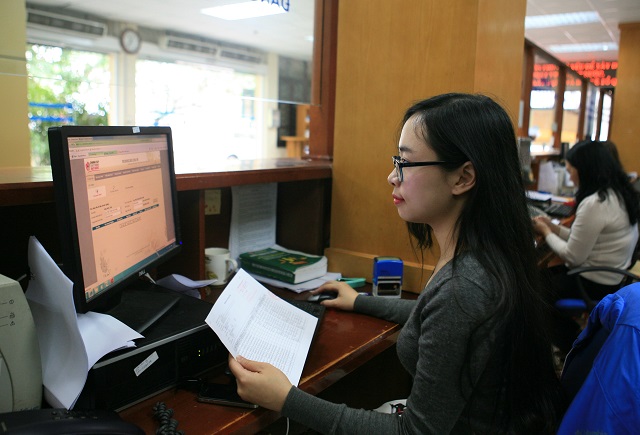Hanoi seeks greater efficiency in e-commerce tax management
Hanoi's e-commerce tax administration is expected to be significantly tightened in the near future.
Hanoi has taken further steps to tighten e-commerce tax administration following a resolution by the municipal People's Committee to improve tax supervision in the expanding e-commerce industry.
Identifying challenges
| The Hanoi Department of Taxation focuses on digitizing e-commerce tax administration. Photo: Thanh Hai/The Hanoi Times |
In the first ten months of this year, the city's e-commerce brought about VND34.2 trillion (US$1.37 billion) to its state budget revenue, marking a 36% increase compared to the same period in 2023.
Of the total, e-commerce enterprises contributed VND32.9 trillion ($1.29 billion) in taxes, up 32%.
While these figures indicate strong sales growth, some experts believe they do not reflect the full scale of the burgeoning e-commerce market. Vietnam's e-commerce sector marks the operations of more than 191,000 organizations and individuals, and 116 foreign merchants have registered and paid taxes through the electronic portal for foreign vendors.
However, this growth presents new challenges for tax administration, particularly in oversight of revenue sources and taxpayers while implementing modern and effective management practices. There are barriers to identifying actors in e-commerce due to the anonymity of information while the reliance on cash on delivery (COD) payments troubles assess to revenue and transaction values.
One of the main objectives of the resolution is to reform tax administration procedures through digital transformation, enabling e-commerce businesses to more easily access public services, especially those provided online.
The initiative, therefore, aims to provide timely information and raise awareness of tax compliance among those engaged in e-commerce. Ultimately, the plan seeks to ensure consistency in the leadership and execution of tax administration for the e-commerce sector in Hanoi.
Enhancing tax administration efficiency in Hanoi
| Online shopping becomes popular in Vietnam. Photo: Tran Dung/The Hanoi Times |
Dr. Nguyen Thi Cam Giang from the Faculty of Finance at the Banking Academy of Vietnam believed that the new regulation will improve compliance by providing registration, declaration, and tax payment procedures through various digital transformation solutions.
She pointed out that by synchronizing citizens' ID data with tax identification numbers, the Hanoi Department of Taxation will be able to build a comprehensive database of personal information, including bank account numbers, revenues, tax levels, and actual cash flows of businesses operating on digital platforms. "This will allow tax authorities to accurately determine the tax bases and obligations of e-commerce businesses, ensuring that they are treated equally with other market players," Giang emphasized.
Increasing the use of information technology in tax procedures, such as registration, filing and payment, will provide taxpayers with faster and easier access to public services.
However, it is critical to ensure the quality of the technology infrastructure, including stable and fast Internet connections in addition to simplifying the information required in tax forms.
The plan calls for closer coordination and proactive collaboration among relevant agencies to raise efficient information sharing and prevent revenue loss.
Meanwhile, economist Nguyen Minh Phong said the resolution focuses on refining mechanisms and legal policies while building a large database. It is essential to strengthen state management of enterprises in accordance with regulations on business registration, taxation, e-commerce, and related sectors.
He also emphasized the need for coordinated efforts in tax administration, including applicable tax administration models, basic databases, and digital solutions for registration, filing, and payment processes. "As a result, there should be a significant improvement in the tax administration of e-commerce in Hanoi in the near future."
To prevent tax losses in e-commerce business activities, the Hanoi Department of Taxation has a plan for inspections and audits focusing on e-commerce in 2024, targeting a total of 2,342 organizations and individuals, of which 1,749 have been audited.
| In 2024, the city has been tasked with collecting over VND408 trillion ($16.1 billion) in taxes, with nearly VND378 trillion ($14.9 billion) coming from domestic revenue sources, the highest in the country. In 2023, the city’s total state budget revenue reached VND405.2 trillion ($16 billion), up 23.8% on year. The results are attributed to efforts in digitization, service enhancements, and effective revenue management. |













